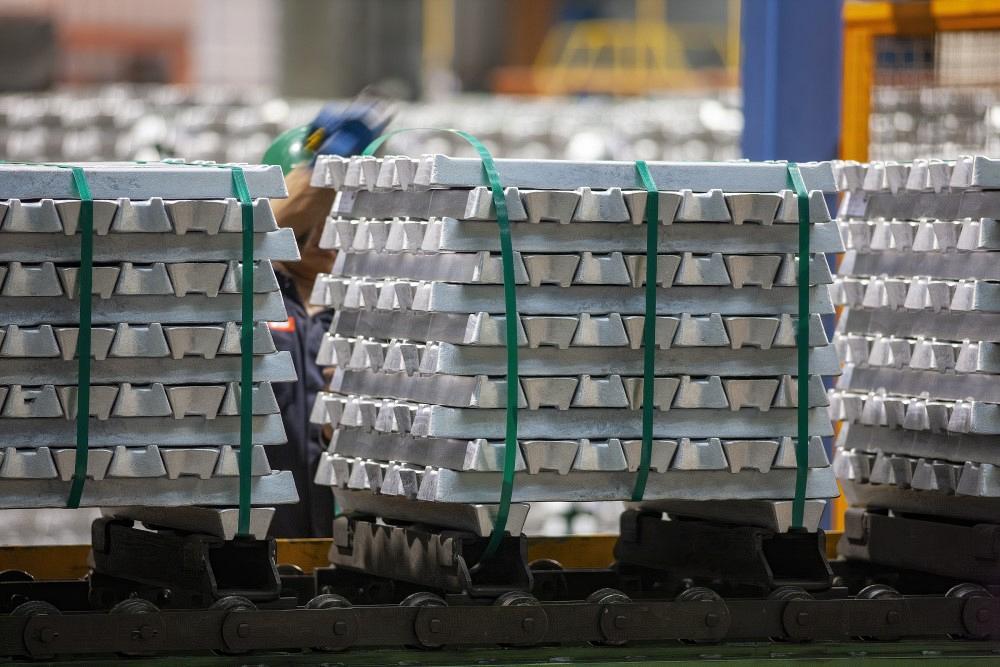Contributing Writer
- FMA
- The Fabricator
- FABTECH
- Canadian Metalworking
Categories
- Additive Manufacturing
- Aluminum Welding
- Arc Welding
- Assembly and Joining
- Automation and Robotics
- Bending and Forming
- Consumables
- Cutting and Weld Prep
- Electric Vehicles
- En Español
- Finishing
- Hydroforming
- Laser Cutting
- Laser Welding
- Machining
- Manufacturing Software
- Materials Handling
- Metals/Materials
- Oxyfuel Cutting
- Plasma Cutting
- Power Tools
- Punching and Other Holemaking
- Roll Forming
- Safety
- Sawing
- Shearing
- Shop Management
- Testing and Measuring
- Tube and Pipe Fabrication
- Tube and Pipe Production
- Waterjet Cutting
Industry Directory
Webcasts
Podcasts
FAB 40
Advertise
Subscribe
Account Login
Search
Aluminum Import Monitoring System goes into effect
Certain imported aluminum products will require a license to enter the U.S.
- By Stephen Barlas
- June 15, 2021

The Aluminum Import Monitoring and Analysis System requires importers, customs brokers, or their agents to apply for and obtain an import license for each entry of certain aluminum products into the U.S. through the system’s website. Getty Images
The U.S. Department of Commerce confirmed most of the requirements of the new Aluminum Import Monitoring and Analysis (AIM) system that go into effect on June 28. Compliance with other sections is being delayed until June 28, 2022.
The AIM system requires importers, customs brokers, or their agents to apply for and obtain an import license for each entry of certain aluminum products into the U.S. through the AIM system website. At that time license applicants are asked to identify, among other requirements, the country or countries where the largest and the second-largest volume of primary aluminum used in the manufacture of the imported aluminum product was smelted (subject to certain exceptions) and the country where the aluminum product was most recently cast. They also must report their license numbers on their entry summary documentation, or electronic equivalent, to U.S. Customs and Border Protection (CBP). The AIM system also allows for the public release of certain import license data on an aggregate basis, as appropriate, on the public AIM monitor. The license requirement applies to all imports of basic aluminum products.
Any licenses that are issued before June 28 and are less than 75 days old can be used for covered aluminum imports on or after June 28. Any licenses that are issued before June 28 and have expired (such as those licenses issued before April 14) might be disregarded. If a party is unsure whether a previously issued license has expired, it might be better off canceling the previous license and obtaining a new one. There is no penalty for unused or canceled licenses. The Commerce Department also requests that parties cancel licenses that will not be used.
The Commerce Department also is extending the period for license applicants to state “unknown” for certain fields on the license application on a temporary basis. This period, originally set to expire Dec. 23, is now extended to June 28, 2022.
This new monitoring system does not include a number of requirements sought by others in the domestic metals industry. One recommendation called for the Commerce Department to require submission of mill test certificates for various inputs consumed at every stage of aluminum products manufacturing. Another recommendation called for the AIM system to require submission of licenses and supporting documentation to CBP, not simply the license number.
The final rule from the Commerce Department stated: “Although these suggestions have merit and warrant further consideration, adopting them at this time would create additional burdens on which the public has not had an opportunity to comment.”
Congress to Make SBA Small Manufacturer Loans Easier to Obtain
Congress is showing bipartisan support for legislation that would make it easier for small manufacturers to secure government-backed loans.
The 504 Modernization and Small Manufacturer Enhancement Act of 2021 passed the House overwhelmingly by a vote of 400-16 in April and looks like a sure thing to pass the Senate. These loans are an important Small Business Administration (SBA) tool that makes it easier for small businesses to purchase machinery and equipment, acquire real estate, or take on other fixed asset costs.
The loan has a three-party structure. An SBA-backed 504 lender provides 40% of the financing, a third-party lender 50%, and a small-business borrower provides 10%.
This legislation increases the maximum loan amount to a company from $5.5 million to $6.5 million and requires SBA district offices to partner with SBA resource partners to provide entrepreneurial development assistance to small manufacturers. The bill also increases the job creation/retention requirements for small manufacturers, adjusts collateral requirements and debt refinance parameters for small manufacturers, streamlines numerous administrative processes associated with the 504 loan closing process, and creates an “express” loan closing program for 504 loans less than $500,000.
subscribe now

The Fabricator is North America's leading magazine for the metal forming and fabricating industry. The magazine delivers the news, technical articles, and case histories that enable fabricators to do their jobs more efficiently. The Fabricator has served the industry since 1970.
start your free subscriptionAbout the Author

Stephen Barlas
- Stay connected from anywhere

Easily access valuable industry resources now with full access to the digital edition of The Fabricator.

Easily access valuable industry resources now with full access to the digital edition of The Welder.

Easily access valuable industry resources now with full access to the digital edition of The Tube and Pipe Journal.
- Podcasting
- Podcast:
- The Fabricator Podcast
- Published:
- 05/14/2024
- Running Time:
- 62:12
Cameron Adams of Laser Precision, a contract metal fabricator in the Chicago area, joins the podcast to talk...
- Trending Articles
What software automation means for custom fabrication

Why employee-owned companies make sense in manufacturing

Nucor’s weekly steel price announcement continues to rattle markets

Press brakes, panel benders, and flat blank calculations

Washington artist creates life-size elk sculptures

- Industry Events
Laser Welding Certificate Course
- May 7 - August 6, 2024
- Farmington Hills, IL
World-Class Roll Forming Workshop
- June 5 - 6, 2024
- Louisville, KY
Advanced Laser Application Workshop
- June 25 - 27, 2024
- Novi, MI
Precision Press Brake Certificate Course
- July 31 - August 1, 2024
- Elgin,



























